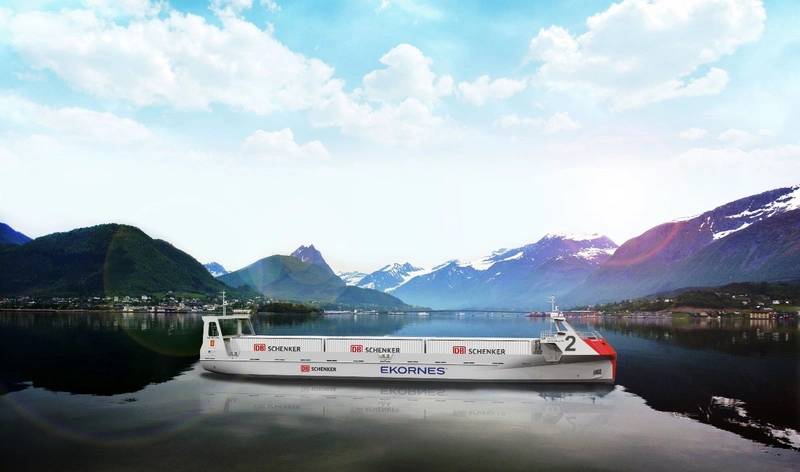DB Schenker to Launch Un-Crewed Coastal Container Feeder in Norway
Supply chain management and logistics solutions firm DB Schenker plans to build a fully-electric, zero-emission, un-crewed coastal container feeder to serve the route between Ikornnes quay and the Port of Ålesund in Norway.
DB Schenker, and its cooperation partners, the furniture giant Ekornes and vessel designers Naval Dynamics, in addition to KONGSBERG and Massterly, aim to replace the traditional feeder vessels utilized along this stretch of the Norwegian coastline.

The new autonomous and electric, short-sea container feeder is based on the Naval Dynamics’ NDS AutoBarge 250 concept developed in partnership with KONGSBERG and Massterly.
The vessel will operate between Ekornes’ own port, at Ikornnes, to the port of Ålesund which serves the main ocean freight ports in Europe, completing the 43km (23NM) voyage within three hours, at a speed of 7.7 knots.
The vessel will be 50 meters long and can carry 300 deadweight tonnes of cargo, and is designed from keel up to be fit for purpose with respect to autonomous and zero-emission operation. The vessel aims to run un-crewed but supervised from Massterly’s Remote Operation Center (ROC) which is staffed with certified navigators and naval engineers.
According to a press statement released Thursday, the planned two-way data communication solution between the vessel and the ROC is destined to be another game-changer in the sea freight sector.
Knut Eriksmoen, CEO Norway, DB Schenker: “We are delighted to further reinforce an already strong relationship with our customer Ekornes. This unique project will mark another important step towards greener supply chains and pays into our overall sustainability agenda in ocean freight. We are ambitiously taking the lead here with our cooperation partners.”
Roger Lunde, CEO, Ekornes AS: "Using the autonomous electric container feeder for direct pick-ups of our Stressless products from our own quay at Ikornnes means that our total carbon footprint will be reduced significantly. We will also gain better control over, and a greater flexibility of, our own logistics.”
Shift away from road transportation
Geir Håøy, CEO, Kongsberg: “We’re beginning to see a general shift away from the road transportation of goods, with its considerable carbon footprint, and towards clean, energy-efficient, short-sea freight transportation. Given our decades of expertise in creating and perfecting systems for ship operations in every context, we are in a unique position to carry out pioneering work on this project. Kongsberg is currently involved in several fully electric and autonomous vessel operations, including Yara Birkeland and ASKO. We look forward to bringing our know-how and experience to this new partnership with DB Schenker and Ekornes."
No details were shared on when the vessel is expected to become operational. The partners said that their joint interest is to unveil the vessel in Norway and "to take the next crucial steps forward by receiving approval from the Norwegian Maritime Authority and possibly secure governmental incentives for the sustainability and technology aspects."
